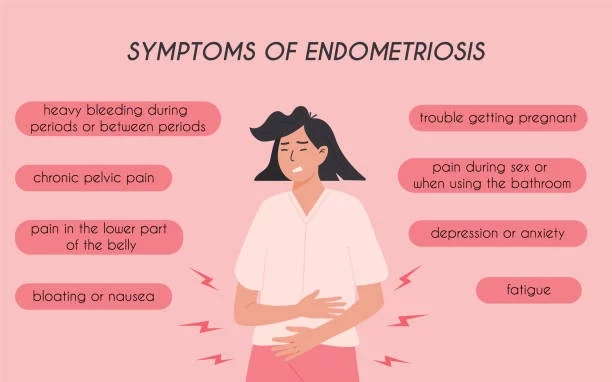Endometriosis is a reproductive condition that causes endometrial tissue to grow outside the uterus in the pelvic region. This tissue can cause symptoms like inflammation, pain, and infertility. Some women have silent endometriosis, which has less obvious symptoms but still causes reproductive and digestive stress. Here are some ways endometriosis and digestive health are connected:
Fatigue
Women who are living with endometriosis may experience fatigue due to the body’s response to inflammation, pain, heavy bleeding, and digestive system disruption. Fighting inflammation uses a significant amount of energy, leading to lower energy reserves for other activities. Endometriosis-related pain can keep women from participating in daily activities and exercise and cause a decrease in energy. Heavy bleeding is another cause of fatigue in women with endometriosis, as it reduces iron levels in the body and causes sleep disturbances.
In some endometriosis cases, tissue adhesions and inflammation impact the digestive system. This may lead to slowed or inefficient digestion, which prevents nutrients from being absorbed properly. When the body does not receive enough nutrition through digestion, it usually becomes fatigued. Other issues, like constipation caused by inflammation, can cause the body to use more energy than usual during digestion, leading to physical and mental exhaustion. If you are experiencing fatigue and digestive issues, contact your reproductive health specialist for a silent endometriosis evaluation.
Irregular Bowel Movements
When endometrial tissue grows outside the womb, it can develop on surrounding organs, like the intestines. When tissue adhesions become inflamed, the inflammation affects the regularity of bowel movements. If you are experiencing more or less than a daily bowel movement, this could be a sign that your digestive system is stressed. The inflammation and stress related to endometriosis can cause constipation and diarrhea, negatively affecting the body’s nutrient absorption. Irregular bowel movements may also result in additional abdominal pain and discomfort. If you experience pain during bowel movements, meet with a health specialist to begin a digestive health treatment plan and learn more about endometriosis management.
Digestive issues that become worse during menstruation could be a sign that the symptoms are connected to endometriosis. Some doctors recommend endometriosis diagnosis methods, like BCL6 tests, to determine whether there is inflammation in the uterine lining that is impacting your overall wellness. They may also recommend anti-inflammatory diet plans to help ease digestive symptom flare-ups.
Hormone Imbalances
Women with endometriosis may have hormone imbalances like elevated estrogen levels and progesterone resistance. When endometrial tissue develops outside the uterus, the hormone signals of estrogen and progesterone are disrupted, leading to imbalances. High levels of estrogen can increase inflammation and pelvic pain. Sometimes, symptoms lead to digestive discomfort and issues like irregular bowel movements, bloating, and nausea. Estrogen dominance may impact gut motility, leading to constipation or diarrhea, and this may be more pronounced during menstruation.
Some reproductive health specialists provide hormone therapy treatments to ease endometriosis symptoms and digestive stress in women with endometriosis. These hormone treatments may include progestins, which mimic the function of progesterone to regulate menstruation and decrease abnormal endometrial tissue growth. Estrogen blockers help reduce the amount of estrogen produced in the body to minimize its inflammatory effect on endometrial tissue. Regulated hormone levels also support more efficient digestion, helping to relieve abdominal discomfort and promote sufficient nutrient absorption.
General Stress
The pain that accompanies endometriosis usually leads to elevated stress levels in the body. High stress levels can impact gut health and slow down or speed up digestive processes. Gastrointestinal symptoms like abdominal pain, indigestion, and excess gas production may be worsened by high stress levels, increasing the physical impact of endometriosis. Receiving treatment for endometriosis often helps relieve general stress and improve digestive health.
Learn More About Silent Endometriosis and Digestion
If you have digestive issues and endometriosis-related concerns, like infertility, meet with a reproductive specialist. These health professionals may recommend diagnostic procedures like a BCL6 marker test, ultrasound, or laparoscopy to determine the presence of endometrial tissue growths in the pelvic region. These tools allow doctors to give you a clear diagnosis and create a treatment plan to manage your endometriosis. Contact a reproductive specialist today to learn more about how getting diagnosed with endometriosis can help you address your digestive health concerns.

Lexy Summer is a talented writer with a deep passion for the art of language and storytelling. With a background in editing and content creation, Lexy has honed her skills in crafting clear, engaging, and grammatically flawless writing.



